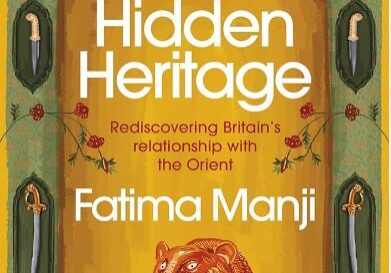Aziz Foundation hosts Webinar with Channel 4 broadcaster Fatima Manji
23 August 2022

The Aziz Foundation hosted award-winning broadcaster and journalist Fatima Manji, who anchors the UK’s Channel 4 News, on 27th July 2022.
Aziz Foundation alumni and journalist, Nimra Shahid, chaired the webinar. Fatima shared her insight and wisdom into the constantly evolving journalism industry and discussed the publication of her book, ‘Hidden Heritage’ ahead of the paperback release in August.
Fatima Manji is an award-winning broadcaster and journalist who anchors the UK’s Channel 4 News, the nation’s most popular adversarial nightly news programme. She reports on major national and international stories, and is best known for breaking stories with a global impact.
Nimra Shahid is an award-winning journalist and investigator at Global Witness, specialising in the link between commodities, deforestation and finance. Nimra previously reported on community affairs and politics for The Guardian’s national and investigations desks.
The webinar covered a variety of topics including being a visibly British Muslim woman in the public eye, how being a Muslim journalist can enrich your reporting and the need for a broader diversity of people getting involved in the heritage sector. Scroll below to find out an overview of the discussion:
Advice for aspiring journalists
- Influence as a journalist
Fatima urges aspiring journalists to consider the influence journalists have. “Think of the impact of your work beyond yourself and the fact when you have a microphone or a pen, you have you have real responsibility. It’s not about you as an individual.”
- Consider the value of having a specialist subject or area
Rather than seeing a specialism as a drawback, consider its benefits. “Increasingly, knowing something about a specific area that’s where you can add value,” Fatima advises. “In terms of career opportunities, being a specialist will make you stand out.”
- Consider how to frame stories when reporting on sensitive issues
Fatima recalls making a documentary with Channel 4 on meeting the policewomen taking on Pakistan’s gender violence epidemic called ‘Unreported World Female Crime Fighters’. As Fatima was aware that violence against women wasn’t specific to solely Pakistan, she was conscious of feeding into negative stereotypes. “While we wanted to do the subject justice, we never wanted to cover it in a way that (suggested) Pakistan was the only place with this problem. We were very conscious about the framing and how specific words we used.”
- Consume a range of media to find follow-up stories
Nimra urges aspiring journalists to approach different publications with ideas you have and reading as much as possible. “As you’re watching and reading on different subjects, consider what questions haven’t been covered and what you’d like to follow up on?” She also encourages aspiring journalists to consider what unanswered questions are there that you can write about and look into. “Through consuming so much news and stories, you start to see how the stories have been structured, who the different characters are and issues are and how the stories come together.”
- Limit your use of social media
Fatima encourages aspiring journalists to not spend time scrolling online. “Don’t let social media take over – you don’t need to react to every little thing.” Even so, she says that if there is genuine criticism and readers or watchers highlight areas you’ve missed in your work, engage with it and improve on it.
- Responding to criticism as a journalist
Fatima uses feedback and criticism to improve your work. “Depending on the nature of criticism, “Depending on the nature of the criticism, (if it’s relevant), you can improve on your work.”
On being a visibly British Muslim woman in the public eye
Fatima was adamant that being a visibly British Muslim woman in the public eye wasn’t to be her defining feature and doesn’t want to let this encroach on her career.
“I was always really clear at the beginning of my career – and still am now – that while I’m a visibly British Muslim woman that cannot be the only thing about me. I wanted to let my journalism do taking. For a long time, I didn’t do stories on (the Muslim community). I started my career in radio and I didn’t want to let (my identity) become my central feature. Saying that, I’m very proud of my culture and religion and its lovely when young people come up to me and say they’re inspired.”
Even so, Fatima stressed that while she doesn’t want her religion to be her defining feature, she is aware that it can enhance her craft. “It’s just about having the honesty in your convictions and being confident that your religious and cultural background is something that enhances you and lets you become a better journalist.”
Nimra agrees and says that it’s important for journalists who understand different communities to be covering different specialisms. “(Subjects such as) the environment, technology, this strand could benefit from our perspective.”
The need for a broader diversity of people getting involved in the heritage sector
Fatima also discussed the need to be a part of telling history rather than leaving it to a small selection of the population who “have their own interest or their own political agendas”. She says: “If we are to tell history in all its ugly and sometimes beautiful truth, then we all need to be a part of telling that and not just.”
“I don’t want to disparage anyone who’s volunteering at a historical site because they may be doing contributing something good to the community but it does mean you have a small percentage of the population with a certain interest of certain political persuasions who are then imparting knowledge to people coming to the sites,” she adds. “Even before volunteering, it’s important to visit these sights.”